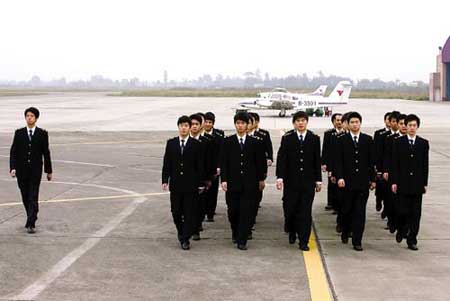200 Chinese pilots faked their resumes
A high demand for pilots, particularly by developing airlines, resulted in Chinese commercial airlines hiring more than 200 pilots who aviation authorities say faked or lied on their resumes between 2008 and 2009.
 |
|
The resumes of more than 200 Chinese commercial pilots were found to have been falsified from 2008-2009, the Civil Aviation Administration of China announced at an August 26 conference. |
The news, announced at a recent aviation-safety conference, comes in the wake of a deadly Henan Airlines crash August 24 that killed 42 of 96 people aboard, ending a six-year stretch of no major plane crashes in China.
The disaster has come as a heavy blow to the nation's fast-growing aviation sector, and the release of the alleged forged-resume findings has served only to fuel public outrage about problems and safety issues regarding airlines that have rushed to catch up with booming demand.
As the investigation into the cause of the crash continues, resumes of more than 200 Chinese commercial pilots were found to have been falsified from 2008-2009, the Civil Aviation Administration of China (CAAC) announced at an August 26 conference, the China Business News reported Monday.
More than half of the pilots were from Shenzhen Airlines, which holds a 51 percent share in Henan Airlines, the report said.
Some of those pilots faked their resumes following frequent job-hopping, and most of them have been ordered to stop flying and to sit examinations in a reassessment of their abilities as pilots, the report said.
The conference focused on the safety checks of the country's fast-growing civil aviation sector, the report said, adding that the qualifications of pilots, trainers, repair crews and air traffic controllers are being scrutinized.
Previous reports have said China had 13,000 commercial pilots in 2008.
Shenzhen Airlines could not be reached for comment Monday.
An insider from Shenzhen Airlines told the Global Times that more than 170 pilots from Shenzhen Airlines have manipulated their flying experience.
"But only three pilots were punished and suspended from flying, as Shenzhen Airlines was in desperate need of pilots in its developing period," he said, adding that that pilots muddled through by bribing officials or through close relations.
The public hasn't been as understanding and willing to forgive.
"It is absolutely shocking to learn story that pilots faked resumes. I don't understand how they could be allowed to operate. Who can protect our passengers' lives?" Song Xiaolei, a 30-year-old man in Beijing who travels at least four times a month, told the Global Times.
The disaster followed the rapid expansion of the aviation industry in recent years. Li Jiaxiang, the director of the CAAC, said last month that the country's air sector is ambitious in striving to be a global civil aviation giant by 2030, according to a report on the official website of the CAAC. But irregularities were not uncommon during the rapid development period of the air industry.
People's Daily reported Monday that some training schools, in an effort to make quick money, faked students' resumes in hopes that they could work for airlines sooner. In 2008, a Beijing-based school was fined after it forged 85 students' records.
Zhang Qihuai, a Beijing-based lawyer and expert on aviation-safety issues, told the Global Times that the CAAC hadn't done enough to prevent safety problems, thereby threatening the "safety of passengers, the public, planes and flight attendants."
"The CAAC needs to establish a more complete, thorough and precise management sys-tem, as well as regulations on aviation schools and the aviation system, without any holes, to prevent or reduce the risk of aviation accidents," Zhang added.
No updates on the cause of the crash in Yichun have been made public, though investigators have recovered the flight recorders.
Media reports have revealed that CAAC officials believed that Qi Quanjun, the airplane captain who survived the disaster, lacked experience and qualifications, as he had flown the E190 plane for just a year.
Li said during the conference that the qualifications of the pilot and captain were to blame for the crash.
 0
0 






